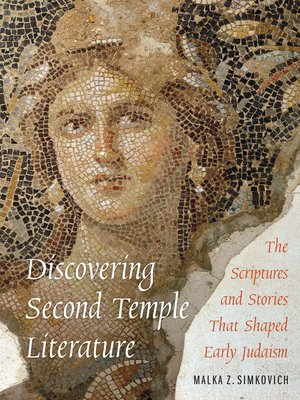Discovering Second Temple Literature
ebook ∣ The Scriptures and Stories That Shaped Early Judaism
By Malka Zeiger Simkovich

Sign up to save your library
With an OverDrive account, you can save your favorite libraries for at-a-glance information about availability. Find out more about OverDrive accounts.
Find this title in Libby, the library reading app by OverDrive.



Search for a digital library with this title
Title found at these libraries:
| Library Name | Distance |
|---|---|
| Loading... |
"For those unfamiliar with the many divisions within Judaism at that time or with Jewish life in other parts of the Roman Empire, this book offers an excellent introduction to a little-studied time period. Readers of Jewish history will definitely want to add this work to their shelves."—Rabbi Rachel Esserman, The Reporter
Exploring the world of the Second Temple period (539 BCE–70 CE), in particular the vastly diverse stories, commentaries, and other documents written by Jews during the last three centuries of this period, Malka Z. Simkovich takes us to Jerusalem, Alexandria, and Antioch, to the Jewish sectarians and the Roman-Jewish historian Josephus, to the Cairo genizah, and to the ancient caves that kept the secrets of the Dead Sea Scrolls. As she recounts Jewish history during this vibrant, formative era, Simkovich analyzes some of the period's most important works for both familiar and possible meanings.
This volume interweaves past and present in four parts. Part 1 tells modern stories of discovery of Second Temple literature. Part 2 describes the Jewish communities that flourished both in the land of Israel and in the Diaspora. Part 3 explores the lives, worldviews, and significant writings of Second Temple authors. Part 4 examines how authors of the time introduced novel, rewritten, and expanded versions of Bible stories in hopes of imparting messages to the people.
Simkovich's popular style will engage readers in understanding the sometimes surprisingly creative ways Jews at this time chose to practice their religion and interpret its scriptures in light of a cultural setting so unlike that of their Israelite forefathers. Like many modern Jews today, they made an ancient religion meaningful in an ever-changing world.







